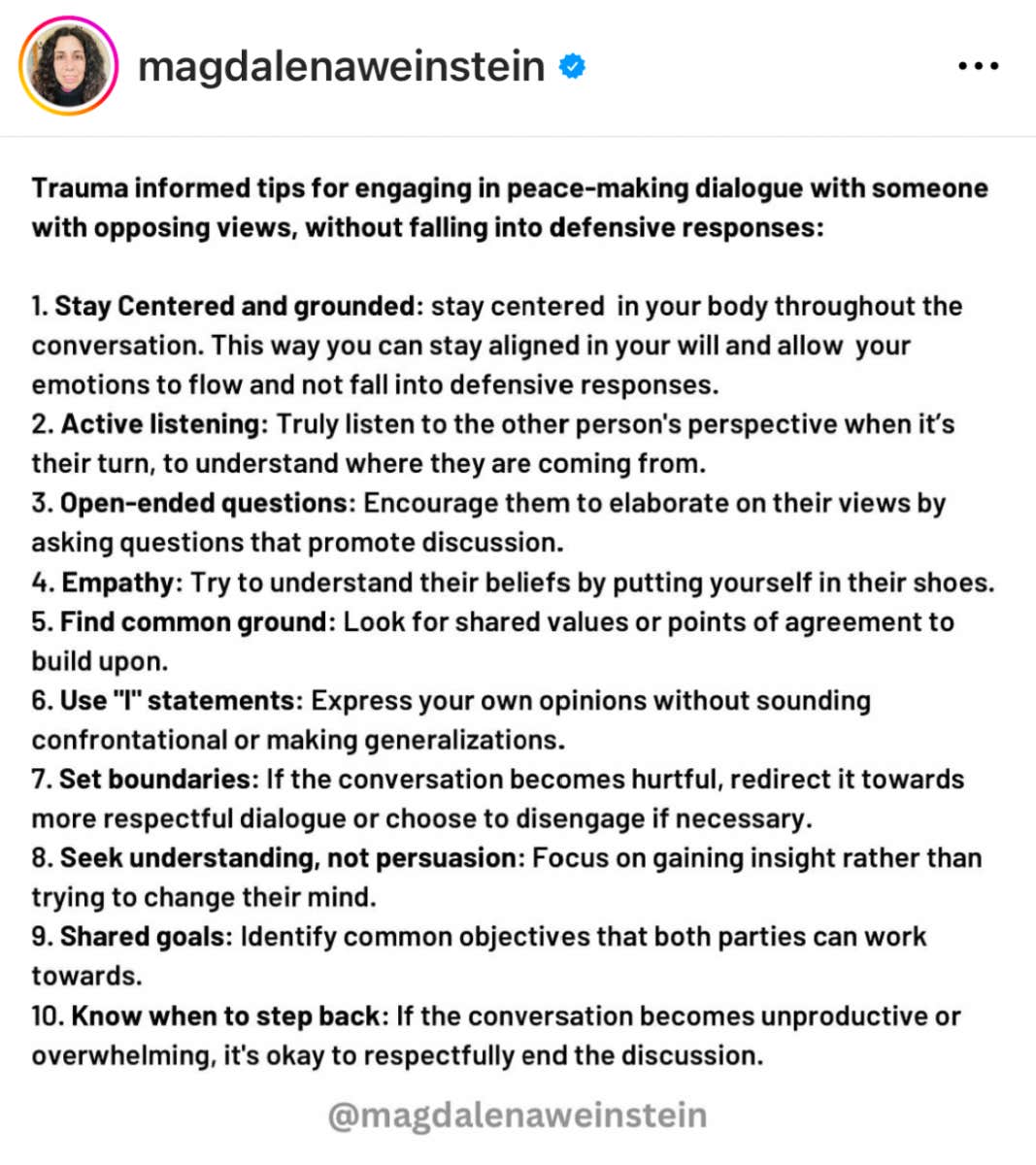How To Have Peaceful Conversations With People You Totally Disagree With
Don't let your nervous system derail you.
 PeopleImages from Getty Images Signature
PeopleImages from Getty Images Signature Navigating disagreements can be brutal in this current political climate. Whether it’s differences in political beliefs or moral stances, making peace may seem downright impossible for some.
So, when you find yourself stuck in a difficult conversation, what can you do to ensure a more respectful and calm dialogue?
Magdalena Weinstein is a somatic trauma specialist who specializes in C-PTSD and chronic conditions. In an Instagram post, she shared her top ten trauma-informed (meaning coming from a place of safety and empowerment while healing) tips for engaging in peace-making dialogue.
10 Trauma-Informed Tips For Peaceful Conversations With People You Don’t Agree With
1. Stay centered and grounded.
Weinstein begins by writing, “Stay centered in your body throughout the conversation. This way you can stay aligned in your will and allow your emotions to flow and not fall in defensive responses.” But understandably this can be difficult to achieve.
Leah Weiss, a researcher at the Stanford Graduate School of Business, writes that one way to stay grounded during stressful moments is to pay attention to our bodies.
How is your body reacting during this stressful situation? Are you tense? Do you feel nervous? Are you fidgeting a lot? Do you feel sick?
When you begin to notice your body’s reaction during stressful conflict, it can help you snap back to reality and ground yourself.
As Weiss puts it, "Our bodies are the quickest, surest way back to the present moment when our minds are lost in rehashing the past or rehearing the future."
2. Practice active listening.
During an argument, listening to one another can become harder. However, as difficult as it is, Weinstein advises us to actively listen to the other person's perspective. As she puts it — through listening, you can begin to understand where the person is coming from.
Ann Chastain explains, “Active listening is a way to hear and respond to another person that will increase shared understanding.”
Pay attention to the points being made. What is the person's viewpoint and what are they trying to convey? Try to paraphrase what they are saying back to them so they know you heard them.
By implementing this small tip, you can better navigate and resolve your conflict.
3. Ask open-ended questions.
When you start to actively listen you may naturally begin to ask a few questions. But be sure your questions remain open-ended!
Weinstein writes, "Encourage them to elaborate on their views by asking questions that promote discussion."
It can be hard to ask open-ended questions when you don't know where to start. Boise State Pressbooks suggests these:
- How did you feel when?
- When did you first notice?
- What happened then?
- What would you like to do about it?
4. Have empathy.
Have you ever heard the common saying, "Try putting yourself in their shoes," before? Well, Weinstein states that if you want to make peace, sometimes it may require empathy.
After all, “Many believe that misunderstanding is the cause of 90% of all conflict,” says mediator and collaborative law practioner Mark B. Baer, Esq.
Not only that, but showing empathy can result in feeling satisfied, relieved, and trustful.
So, even when it gets hard, try and show a little bit of understanding during conflict — it may just result in a more peaceful conversation.
5. Find common ground.
Arguably, one of the most crucial aspects of solving conflict is through finding common ground. Weinstein writes, “Look for shared values or pints of agreement to build upon.”
Okay, but how do we do this? According to entrepreneur Kevin Elkenberry, during conflict, it’s important to set your focus on the bigger picture. What do you want the outcome of this conversation to be? Or what goals are you trying to accomplish?
If you’re struggling with what to agree on, Elkenberry writes to agree on the why instead of the what.
He writes, “When everyone understands the purpose or why something needs to be achieved, we then have the foundation to find common ground."
 Photo: Magdalena Weinstein on Instagram
Photo: Magdalena Weinstein on Instagram
6. Use “I” statements.
When arguing with someone, it’s easy to point the finger — and we may not even notice it! But little statements such as “you” can make the person you are arguing with feel that they are being unfairly criticized.
This is why it’s important to, “Express your own opinions without sounding confrontational or making generalizations,” writes Weinstein.
And the best way to do this is by using "I" statements. For example instead of saying, “You are making me feel angry,” try saying, “I feel angry right now.”
This slight change can make the biggest difference between your person feeling defensive or receptive.
7. Set boundaries.
During an intense argument, it may be necessary to draw the line.
“If the conversation becomes hurtful, redirect it towards more respectful dialogue or choose to disengage, if necessary,” writes Weinstein.
But if you aren’t sure how to set boundaries, try these tips from psychologist Dr. Lynn Margolies:
- Tell the person you are in an argument with what you are going to do.
- Be firm in your boundary setting. With a neutral tone tell that person your limits and go through with consequences if they do not respect your limits.
- Be sure your limits have to do with you and not them.
- If you are wrong, admit to it. Margolies writes, “Allowing the other person to hold onto their viewpoint prevents a control struggle and is respectful.”
8. Seek understanding, not persuasion.
It's natural to feel that you must prove your point during conflict. But remember, the goal during conflict isn't to be persuasive but to be understanding!
Through shared understanding, you make it much easier to better address and resolve the conflict at hand.
9. Identify shared goals.
Weinstein writes, “Identify common objectives that both parties can work towards.” Discuss your intentions for this conversation so you can steer the conversation in a better direction!
And if your goals aren't aligned, then through discussion you can reach a more balanced conclusion.
You see, when you emphasize discussion, you are putting resolution first.
10. Know when to step back.
When you reach a point in your conversation when it becomes unproductive, take a step back!
According to mediator and coach Tammy Lenski, she calls this moment her choice point. She writes, “It’s the moment you choose to fight — or not.”
She adds that we have a common misconception that backing away means running away during conflict. But as she points out, the real failure is jumping off the cliff because you refuse to step away.
If you aren’t sure how to step back, Lenski offers some great phrases you can use during conflict:
- I think this conversation went in a different direction and I would like for us to get back on track.
- I think we are headed into a mess so let’s take a step back.
- I got swept up in the moment and was unhelpful. Please allow me a moment so I can try again.
Through these phrases, you can diffuse a potentially destructive conversation and steer your conversation in a clearer and healthier direction!
Marielisa Reyes is a writer with a bachelor's degree in psychology who covers self-help, relationships, career, and family topics.
